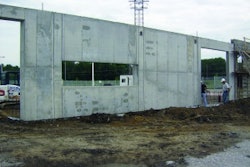Once again, it appears the construction industry may get the short end of the legislative "straw." The latest example? Climate control legislation.
This past month, Senators John Kerry (D-Mass.) and Joe Lieberman (I-Conn.) unveiled the "American Power Act" (APA), a plan to establish a national pollution "cap" and require all sectors of the U.S. economy to purchase allowances corresponding with their forecasted greenhouse gas emissions. Of particular interest, oil refiners would be required to purchase carbon emission allowances that would gradually increase over time. The thought is the resulting increase in fuel production costs will serve as an incentive to reduce U.S. fuel consumption (due to higher fuel prices), and thus dependence on foreign oils, and promote the use of cleaner fuel sources.
Within days of the APA's introduction, 28 groups - including the American Association of State Highway and Transportation Officials (AASHTO), Associated General Contractors of America (AGC), American Road and Transportation Builders Association (ARTBA) and American Public Transportation Association (APTA) - came out against it. The reason, according to the AGC, is "the Senate climate change bill neglects efforts to cut traffic congestion and breaks a decades-long promise that transportation user fees will be dedicated to financing highway and transit improvements."
At issue is how funds generated by the "pollution fees" would be allocated. According to the AGC, APTA and AASHTO, fees on gasoline and diesel fuels are estimated to generate at least $19.5 billion in revenue in 2013. Of that, 77% would be diverted to non-transportation activities. (This would increase to as much as 91% as carbon prices increase.) The bill goes on to limit new investment in the Highway Trust Fund (HTF) to $2.5 billion, with the remainder divided between the federal TIGER grants and local land-use planning under the CLEAN-TEA bill.
There is also concern that, by incorporating such fees into climate control legislation, it dashes any hopes of using highway user fees as a funding mechanism for the cash-strapped HTF. Eliminating this popular funding option could result in further delays in federal highway bill reauthorization.
Although Senators Kerry and Lieberman dispute the estimated dollar amounts being presented by these organizations, it's clear their joint legislation has flaws. These flaws could have serious repercussions to the entire construction industry - the least of which is an increase in annual fuel costs.
With growing momentum being placed on environmental stewardship in the wake of the Gulf oil spill, and the potential for a filibuster-proof vote in a lopsided Congress, our elected officials are set to push through yet another piece of faulty legislation (remember financial reform and health care?) in the name of a further political "victory" ahead of November's mid-term elections. Waiting to see if this happens is clearly not the best option.
If you haven't already, contact your congressional representative to push for more equitable legislation. The alternative is to watch even more of your federal tax dollars get siphoned off into uses for which they were never intended.


















